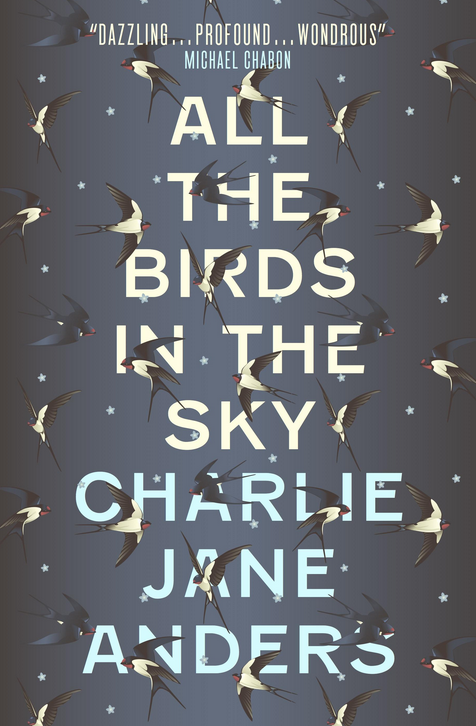
When I have had a really overwhelming book experience, as I had with Becky Chambers’ Books, I am often lost to reading for a week or two, unable to recapture the feeling inspired by the book I have just finished. Thanks to Kobo’s recommended books feature, that difficulty is somewhat mitigated, although, for the first half of All The Birds In The Sky, I did feel a little disengaged.
To an extent, that may have been simply that this book suffered by comparison. It is a clever and beautiful premise, that moves steadily and gracefully from American high-school realism into a fantasy/SF mix that charts the collapse of the world into ecological and economic disaster. At first, it felt a little pedestrian after Becky Chambers’ beautiful companionship, despite its early magical elements which lay the groundwork for what is to come. A part of my discomfort, however, was with Anders’ tone: she writes with a sort of glib, coffee-shop blogger’s self-assurance that it took me a while to come to terms with.
However, her characters and, particularly, her settings, which get more other-worldly as she moves away from the familiar now, grow to suit her cosmopolitan, Californian writer voice. This is a world of bloggers, web-comic artists, start-up sharks, musicians, magicians and inventors. The two protagonists, Patricia and Laurence, each start out as outcasts and grow to be extraordinary: she, as a witch who is discovered, educated and manipulated by the magical underworld, and he as an engineer who is taken under the wing of a technological visionary who has made it his business to save the human race from its own folly.
The greatness into which this book develops is the balance between two outlooks, the technocratic and the mystical, which, while it produces a really powerful fantasy, at least in its second half, achieves a balance between the two. In other words, the artistic product becomes representative of its own plot theme. Last Saturday, despite having had a long, tiring day, I stayed awake after we’d gone to bed, reading for two hours until I’d finished the book. By the end, I was entirely seduced.
She skirted some considerable risks in the writing of this book. It cannot be easy to do a ‘realist’ SF book in which there is a school for witches. Somehow, she managed to avoid the Hogwarts comparisons, and produce an experience of magical polity that is true to its own vision without being parody. In the same way, her fictional tech is brilliantly persuasive. I felt as though I had seen a caddy and really needed to get one.
The resolution of the plot is a surprise. It is preceded by utter devastation and apparently irremediable defeat. I felt real grief during the descriptions of the catastrophes that begin the collapse of civilization, as global warming begins to bite into American civilization. It was, I realized, something that SF should do all the time, but seldom achieves: to visualize what the currents of contemporary experience predict, and to make them seem as though they are already happening. This novel is a fine achievement, and I will look out for her next with eagerness.